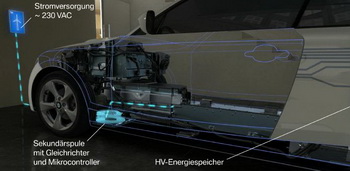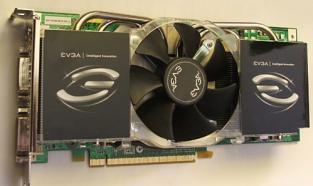OOPS! You forgot to upload swfobject.js ! You must upload this file for your form to work.
BMW and Daimler are developing wireless charging system for vehicles
![]()
|
xtreview is your : Video card - cpu - memory - Hard drive - power supply unit source |
|
|||
|
|
||||
 Recommended : Free unlimited image hosting with image editor
Recommended : Free unlimited image hosting with image editor
|
POSTER: computer news || BMW AND DAIMLER ARE DEVELOPING WIRELESS CHARGING SYSTEM FOR VEHICLES |
DATE:2014-07-10 |
|
|
Technology wireless charging of mobile devices gradually come to a common denominator and standard. Automakers are beginning to integrate wireless charging device for smart phones in the vicinity of the front of the vehicles. Meanwhile, searching for an alternative to machines hydrocarbon fuels, producers increasingly look for hybrid or electric systems, which require daily recharging. To facilitate this process and make it transparent, manufacturers are thinking about implementing a wireless charging method of traction batteries. This can not be called a new idea, but it concerns BMW and Daimler are trying to implement wireless charging technology of hybrid and electric vehicles. Existing prototypes that BMW tests on their models i8 (rechargeable hybrid) and i3 (with optional electric "xtension course based on ICE) allows wirelessly transmit up to 3.6 kW of power through two loops placed underneath the car and supporting surface respectively. BMW claims that the charger has an efficiency of at least 90%, and the presence of snow or water on the support surface does not interfere with work.  Opportunities such charger should be enough to recharge the battery in a hybrid car two or three hours. According to the developers, if necessary transmit power can be increased to 7 kW, and it will allow for faster charging electric cars that rely only on batteries as a power source. For efficient operation of the charger circuits has to be aligned one above the other with sufficient accuracy, so the car and built-in garage floor will exchange coordinates wirelessly WiFi. If we consider that an automatic parking system is implemented on a production car, the positioning process can be without human intervention. Control the charging process can be remotely via smartphone. A variation of this system can be considered complex chargers for public electric, which allows you to charge batteries at stops while going embarkation and disembarkation of passengers. Related Products : | ||
|
|
||
|
xtreview is your : Video card - cpu - memory - Hard drive - power supply unit source |
|
|
|
|
||
|
Xtreview Support  N-Post:xxxx Xtreview Support        |
BMW AND DAIMLER ARE DEVELOPING WIRELESS CHARGING SYSTEM FOR VEHICLES |
| Please Feel Free to write any Comment; Thanks  |
Radeon RX Vega 57, 58 and 59: the wonders of transformation (2017-09-07)
Meizu will release Android-smartphone based on Helio P40 (2017-09-07)
Lenovo released Android-smartphone K8 (2017-09-07)
Panasonic P9 a new Android-smartphone entry-level (2017-09-07)
Huawei overtook Apple and became the second largest smartphone manufacturer in the world (2017-09-07)
China banned the creation of new ICO crypto-currency and ordered to return the money for the created one (2017-09-06)
Vivo X20 and X20A certified by TENAA (2017-09-06)
Budget Android-smartphone Xiaomi certified in China (2017-09-06)
Lenovo K8 Note with a dual camera and a 4000 mAh battery (2017-09-06)
Xbox One will get keyboard and mouse support (2017-09-05)
AMD processors with Zen architecture of the second generation will raise frequencies and specific performance (2017-09-05)
Samsung has released an Android-smartphone Galaxy J7 plus with a dual camera (2017-09-04)
MediaTek announces 8-core 16-nm mobile chips Helio P23 and Helio P30 (2017-08-30)
Specifications PCIe 4.0 will see the light this year, and PCIe 5.0 in 2019 (2017-08-30)
Samsung expects to sell more than 11 million Android-smartphones Galaxy Note 8 (2017-08-29)
Not more than half of Germans and Americans are ready to use robotic vehicles (2017-08-28)
The code name of the Android-smartphone Huawei Mate 10 (2017-08-28)
New photos of Android-smartphone LG V30 (2017-08-28)
The decision on the transaction between WDC and Toshiba can be made on August 31 (2017-08-27)
Core i9-7960X and Cinebench R15 record now at 5639 MHz (2017-08-27)
![]()
To figure out your best laptops .Welcome to XTreview.com. Here u can find a complete computer hardware guide and laptop rating .More than 500 reviews of modern PC to understand the basic architecture


7600gt review
7600gt is the middle card range.
We already benchmarked this video card and found that ...

 geforce 8800gtx and 8800gts
geforce 8800gtx and 8800gts  Xtreview software download Section
Xtreview software download Section  AMD TURION 64 X2 REVIEW
AMD TURION 64 X2 REVIEW  INTEL PENTIUM D 920 , INTEL PENTIUM D 930
INTEL PENTIUM D 920 , INTEL PENTIUM D 930  6800XT REVIEW
6800XT REVIEW  computer hardware REVIEW
computer hardware REVIEW  INTEL CONROE CORE DUO 2 REVIEW VS AMD AM2
INTEL CONROE CORE DUO 2 REVIEW VS AMD AM2  INTEL PENTIUM D 805 INTEL D805
INTEL PENTIUM D 805 INTEL D805  Free desktop wallpaper
Free desktop wallpaper  online fighting game
online fighting game  Xtreview price comparison center
Xtreview price comparison center Lastest 15 Reviews


Rss Feeds
Last News
- The new version of GPU-Z finally kills the belief in the miracle of Vega transformation
- The motherboard manufacturer confirms the characteristics of the processors Coffee Lake
- We are looking for copper coolers on NVIDIA Volta computing accelerators
- Unofficially about Intels plans to release 300-series chipset
- The Japanese representation of AMD offered monetary compensation to the first buyers of Ryzen Threadripper
- This year will not be released more than 45 million motherboards
- TSMC denies the presentation of charges from the antimonopoly authorities
- Radeon RX Vega 64 at frequencies 1802-1000 MHz updated the record GPUPI 1B
- AMD itself would like to believe that mobile processors Ryzen have already been released
- AMD Vega 20 will find application in accelerating computations
- Pre-orders for new iPhone start next week
- Radeon RX Vega 57, 58 and 59: the wonders of transformation
- ASML starts commercial delivery of EUV-scanners
- The older Skylake processors with a free multiplier are removed from production
- Meizu will release Android-smartphone based on Helio P40
- AMD Bristol Ridge processors are also available in American retail
- The fate of Toshiba Memory can be solved to the next environment
- duo GeForce GTX 1080 Ti in GPUPI 1B at frequencies of 2480-10320 MHz
- New Kentsfield overclocking record up to 5204 MHz
- Lenovo released Android-smartphone K8

HALO 3 HALO 3 - Final Fight!

PREY Prey is something you don t often see anymore: a totally unigue shooter experience.

computer news computer parts review Old Forum Downloads New Forum Login Join Articles terms Hardware blog Sitemap Get Freebies


